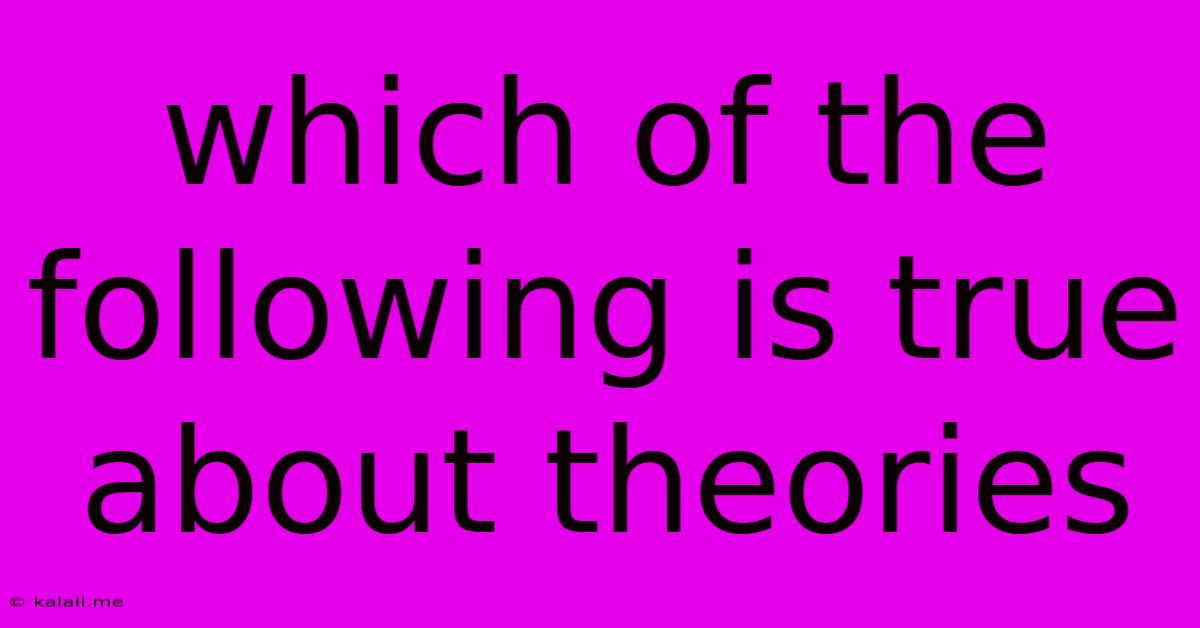Which Of The Following Is True About Theories
Kalali
Jun 15, 2025 · 3 min read

Table of Contents
Which of the Following is True About Theories? Deconstructing Scientific Understanding
The question "Which of the following is true about theories?" requires a nuanced answer, going beyond simple true/false statements. Understanding what constitutes a scientific theory is crucial, and this article will explore the common misconceptions and clarify the true nature of scientific theories. This will help you better understand how scientific knowledge is built and refined.
What is a Scientific Theory? A Common Misunderstanding
Many people mistakenly believe a theory is simply a guess or a hunch. This is a significant misunderstanding. In science, a theory is a well-substantiated explanation of some aspect of the natural world, based on a vast body of evidence. It's not a wild speculation; rather, it represents the current best explanation supported by rigorous testing and observation. This explanation is constantly refined as new evidence emerges.
Key Characteristics of Scientific Theories:
- Evidence-Based: Theories are built upon a substantial amount of empirical evidence gathered through observation, experimentation, and data analysis. This data provides the foundation for the theoretical framework.
- Testable and Falsifiable: A crucial aspect of a scientific theory is its testability. It must generate predictions that can be tested through experiments or further observations. Furthermore, it must be potentially falsifiable – meaning there must be a way to prove it wrong. This ability to be disproven is a strength, not a weakness.
- Explanatory Power: A good theory explains a wide range of phenomena, connecting seemingly disparate observations under a unified framework. It provides a coherent explanation for existing data and predicts new observations.
- Predictive Power: A strong theory allows scientists to make accurate predictions about future events or observations. These predictions are then tested to further validate or refine the theory.
- Evolving and Dynamic: Scientific theories are not static; they are constantly being refined, revised, or even replaced as new evidence emerges. The scientific process is iterative, constantly seeking more accurate and comprehensive explanations.
What is NOT True About Theories:
- Theories are just guesses: As stated above, this is a common misconception. Theories are the culmination of extensive research and rigorous testing.
- Theories become laws: Theories and scientific laws serve different purposes. Laws describe what happens under specific conditions, while theories explain why it happens. They are not interchangeable.
- Theories are proven facts: Theories are not "proven" in the absolute sense. They are the best explanations currently available, supported by a vast body of evidence, but always subject to revision in light of new discoveries.
Examples of Scientific Theories:
- Theory of Evolution: Explains the diversity of life on Earth through the mechanisms of natural selection and genetic variation.
- Theory of Relativity: Explains the relationship between space, time, gravity, and the universe at large.
- Germ Theory of Disease: Explains that many diseases are caused by microorganisms.
Conclusion:
Understanding what a scientific theory truly represents is vital for critical thinking and scientific literacy. Theories are not merely guesses; they are robust explanations based on extensive evidence, constantly refined through rigorous testing and observation. They represent our best understanding of the natural world, constantly evolving as we gain more knowledge. The ability to be tested and potentially falsified is a defining characteristic of a strong scientific theory, highlighting the self-correcting nature of science.
Latest Posts
Latest Posts
-
Polar Moment Of Inertia Of Square
Jun 15, 2025
-
Which Of The Following Represents A Quantitative Research Design
Jun 15, 2025
-
Which Of The Following Is Not A Fundamental Quantity
Jun 15, 2025
-
Which Of The Following Is Not A Dimension Of Quality
Jun 15, 2025
-
What Is The Output Of The Following Code
Jun 15, 2025
Related Post
Thank you for visiting our website which covers about Which Of The Following Is True About Theories . We hope the information provided has been useful to you. Feel free to contact us if you have any questions or need further assistance. See you next time and don't miss to bookmark.